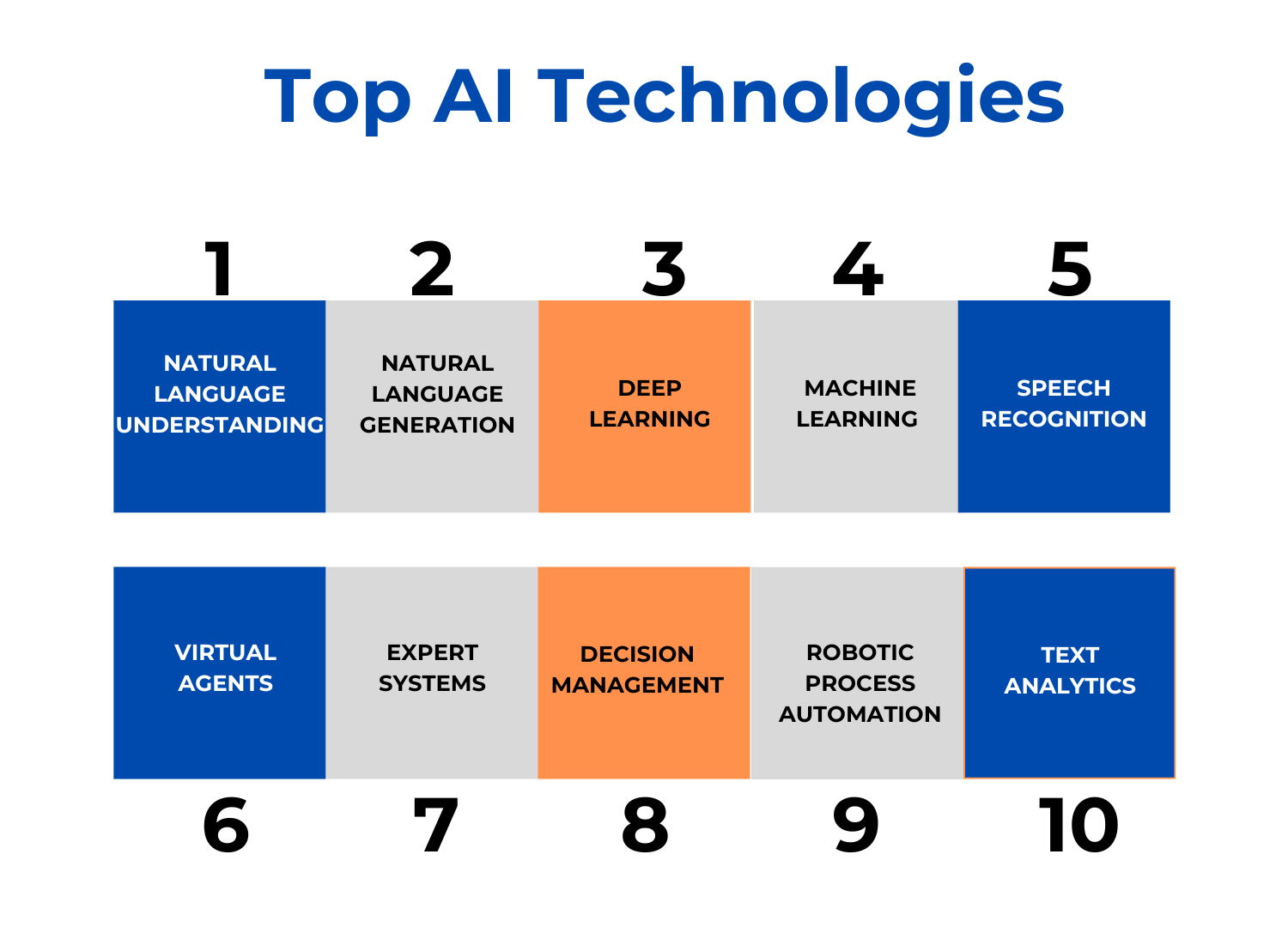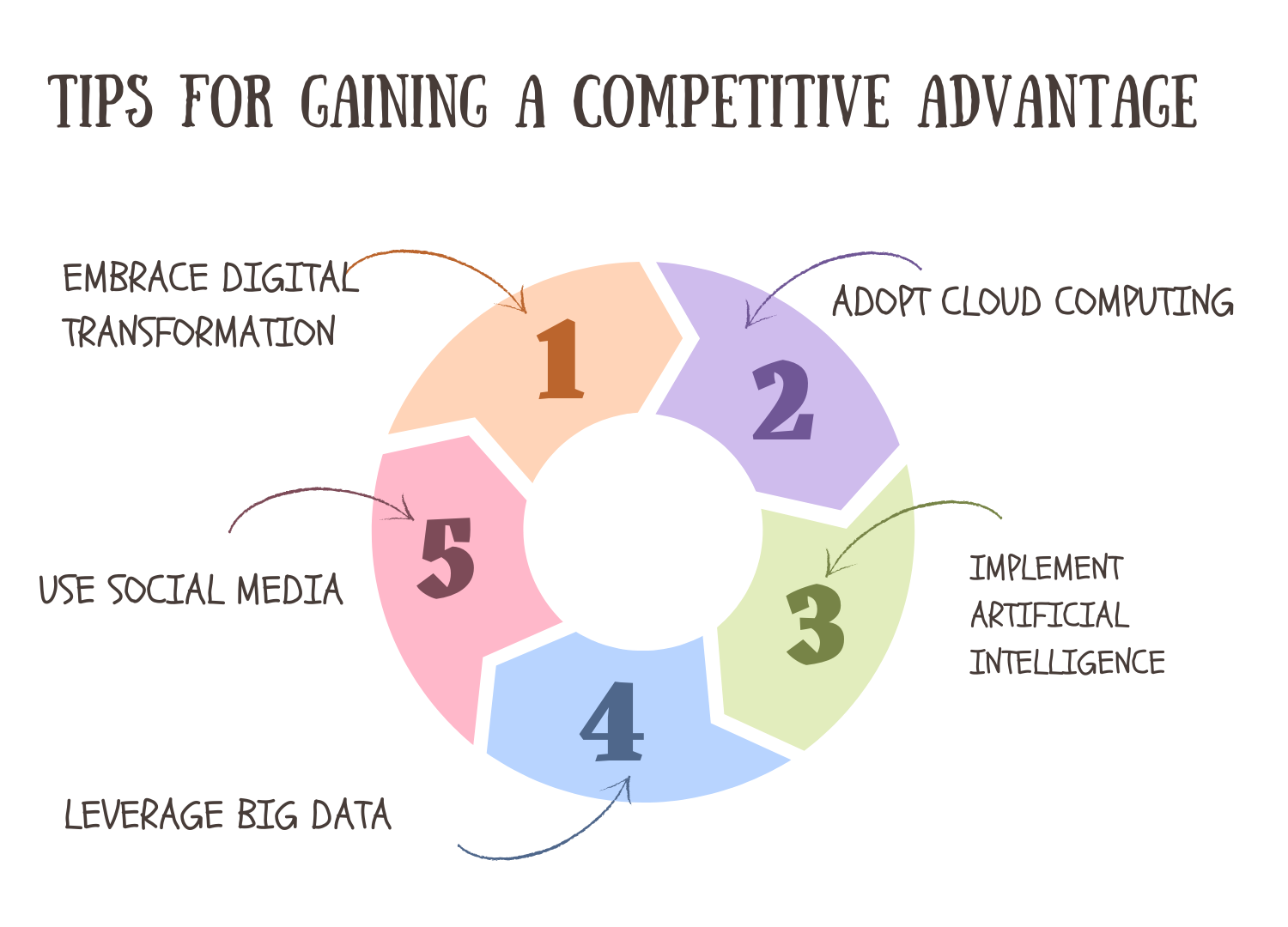Table of Contents
Artificial Intelligence and Machine Learning Technology (AI & ML) are a groundbreaker in the rapidly changing world. They are altering entire sectors and business processes. These technologies provide businesses with various benefits. It allows businesses to improve client experiences, streamline processes, and make better decisions. Gaining a competitive edge is important for long-term success. Especially in the current data-driven and evolving corporate environment. The technologies of Artificial Intelligence and Machine Learning have the potential to completely change the way organizations function. According to a recent Gartner survey, up to 37% of firms presently use AI in some capacity.
Organizations may gain important insights, automate procedures, improve customer experiences, and make deft decisions more quickly than ever before by utilizing AI & ML. Having a strong artificial intelligence strategy is essential for companies looking to get a competitive edge. AI is still transforming industries by improving decision-making, expediting procedures, and stimulating creativity.
Through the development of a strategic AI approach, companies may provide tailored consumer experiences. This crucial combination fosters creativity, raises customer happiness, and establishes a unique brand identity. Businesses can get ahead of their competitors through AI & ML implementation.
Defining Artificial intelligence
Artificial intelligence is the process of transmitting data, information, and human intelligence to machines. The main objective of artificial intelligence is to create independent machines with human-like thinking and behavior. These machines can replicate human behavior and carry out tasks through learning and problem-solving. To resolve complicated issues, the majority of AI systems mimic natural intelligence.
Let AI & ML Handle Your Repetitive Tasks and Streamline Your Business Operations
Machine learning: What is it?
A branch of computer science called machine learning builds prediction models that can address business issues by utilizing analytics and computer algorithms.
Machine learning, according to McKinsey & Co., is predicated on algorithms that are capable of learning from data without the use of rules-based programming.
“A computer program is said to learn from experience E concerning some class of tasks T and performance measure P, if its performance at tasks in T, as measured by P, improves with experience E,” according to Tom Mitchell’s machine learning book.
| Aspect | Artificial Intelligence (AI) | Machine Learning (ML) |
|---|---|---|
| What is it? | A broad term for machine-based applications mimicking human intelligence | Methodology within AI for identifying patterns in data |
| Best suited for | Completing complex human tasks with efficiency | Identifying patterns in large datasets to solve problems |
| Methods | Wide range including rule-based, neural networks, computer vision, etc. | Feature extraction, model training, supervised/unsupervised learning |
| Implementation | Task-dependent, often prebuilt and accessed via APIs | Training new or existing models for specific use cases, prebuilt APIs available |
Benefits of Integrating AI & ML in Business
Fraud Identification and Online Safety
Fraud attempts and cybersecurity risks are increasing in today’s digital environment. To identify and stop these hostile operations, AI & ML are essential. Large-scale data sets can be analyzed by machine learning algorithms to find trends and abnormalities that might point to fraud.
Businesses may reduce financial losses, safeguard client data, and uphold their brand through digital and automated methods by implementing AI-driven fraud detection systems. Organizations can enhance their client base and get a competitive edge in the increasingly digital world by maintaining a constant state of readiness against cyber attacks.
Talks on the value of ChatGPT and other similar models —which can be used to create offensive or even dangerous code—also center on cybersecurity. Even while GPT is designed to be transparent about its wholesomeness and good intentions, it can still be used for evil, which makes many doubt its long-term value.
Remember these pointers while utilizing generative AI in security to minimize danger to you and your company:
- – Understand that there isn’t much regulatory control about dishonest people or copyright laws. Therefore adopt the necessary security measures to safeguard the information and intellectual property of your company.
- – Hire AI consulting companies if you aren’t sure.
- – Don’t take the AI system’s output as the final word. Remember that AI algorithms can get only as good as the data they train on.
A data breach or other security event could affect your company, therefore avoid entering sensitive or secret data into AI systems.
Data-Informed Decision Making
The capacity of AI & ML to process and analyze enormous volumes of data quickly and reliably is among its greatest benefits. Businesses can make data-driven decisions based on real-time insights and real financial benefits by utilizing AI algorithms. 80% of executives in a different Gartner survey said they could use automation in any kind of business decision.
Organizations can optimize their operations, find new opportunities, and reduce risks. This can be done by using AI-powered analytics tools. These tools can identify patterns, trends, and correlations that we might miss. Businesses can obtain a competitive edge by being proactive, flexible, and agile in a market. Today’s market is constantly changing by depending on data-driven decision-making.
Improved Client Relationship
AI & ML have completely changed how companies communicate with their clients. Businesses may offer their clients seamless, personal experiences by utilizing chatbots, virtual assistants, and recommendation systems.
Chatbots with AI capabilities may respond to support and customer service requests around the clock, increasing customer satisfaction and response times. To provide tailored marketing campaigns and recommendations, machine learning algorithms can examine the preferences and behavior of their customers. Businesses may cultivate client loyalty, boost retention rates, and outperform their rivals by improving the customer experience.
A vital benefit of AI in business is the employment of chatbots, which are primarily driven by GPT. In addition to providing round-the-clock customer support, these bots can access virtually infinite amounts of data to guarantee that end users are getting the greatest knowledge and experience possible all in one place. These bots are almost identical to their human counterparts in the majority of situations.
Efficiency and Automation of Processes
Automating tedious tasks & time-consuming operations is the top feature of Artificial intelligence and machine learning companies. This gives time to human resources to work on more strategic projects. Algorithms for machine learning can be trained to identify patterns and carry out difficult tasks with little assistance from humans.
Significant cost savings, decreased errors, and better efficiency are the results of this automation. By using AI & ML to automate their processes, organizations may gain a competitive edge and streamline operations by automating tasks like supply chain logistics optimization and inventory management.
Predictive Analytics
Being able to forecast market dynamics, consumer behavior, and future trends is essential for being competitive. AI & ML are capable of accurately predicting future events by analyzing past data to find trends. Businesses can predict demand, improve pricing tactics, and anticipate client demands by using predictive analytics services.
By adopting a proactive approach, firms may effectively allocate resources and make strategic decisions. They can also seize emerging opportunities ahead of their competitors. With the power of predictive analytics, businesses can generate enormous industry benefits.
These kinds of AI models are currently being used by companies such as automotive masterminds and other sales-oriented enterprises to process massive volumes of data and run it through many models in an attempt to find correlations that humans would not be able to make on their own. Assume, for instance, that someone is actively looking for an upgrade and wants a nicer car. AI is capable of analyzing buyer intent data, or what the buyer is seeking, and locating other purchasers who have that desire. The AI can then suggest vehicles that people who are similar to them have bought. Dealerships can purchase and sell more precisely and effectively as a result, anticipating customer needs ahead of time.
Better Innovation and Product Development
The processes involved in innovation and product creation can be greatly impacted by AI and machine learning. Artificial Intelligence (AI) algorithms can offer significant insights to steer product development by evaluating copious volumes of data, encompassing competition insights, market trends, and customer input. By recognizing trends and forecasting customer preferences, machine learning models assist companies in creating products that appeal to their target market.
Furthermore, testing and prototyping phases can be automated and accelerated by AI-powered systems, which lowers time-to-market overall and helps companies stay ahead of their rivals.
Businesses can develop novel products, customize them to meet client wants, and gain a competitive edge by producing superior products by utilizing AI in software development.
Operational Efficiency and Optimization
Several corporate operations can be optimized using AI & ML, which can increase productivity and save costs. AI systems, for instance, can evaluate past data to improve inventory management, which helps forecast demand trends and lessen shortages or surplus stock. By locating bottlenecks, proposing process enhancements, and anticipating the need for equipment repair to save downtime, ML models can optimize production operations.
Businesses need to offer competitive rates while maximizing profits. AI-powered algorithms can help to optimize pricing strategies depending on market conditions, customer behavior, and competitive pricing. Businesses can get a competitive edge by being more efficient than their competitors, optimizing their processes, cutting expenses, and streamlining operations with AI and machine learning.
Unlock the Path to Efficiency by Automating Tasks
Enhance Management of the Supply Chain
AI systems are frequently employed to manage and optimize supply chains, which is challenging. Using AI’s capacity for predictive analytics, machine learning, and optimization algorithms, this work modifies inventory-level information in an effective manner, streamlines logistics processes, and improves visibility and transparency. With AI tools at their disposal, companies may minimize disruptions caused by shifting client needs and react swiftly to changing market conditions. To put it briefly, supply chain optimization driven by AI helps companies increase productivity, cut expenses, and manage risks through the supply chain.
To illustrate, consider manufacturing organizations that anticipate demand changes via AI-powered demand forecasting. Businesses can minimize manufacturing costs, minimize surplus inventory, and modify production schedules by the information given by the solution. Similarly, logistics firms can select more effective delivery routes, use less fuel, and increase the percentage of on-time deliveries by utilizing AI-powered route optimization.
Engage Consumers through Customized Marketing
Businesses can send clients relevant and tailored communications based on their interests, activities, and demographics thanks to AI-powered personalized marketing. AI in marketing may develop hyper-personalized marketing strategies that connect with their target audience and increase engagement and conversion rates by utilizing machine learning algorithms and consumer data analysis.
Through improved client happiness, loyalty, and retention, personalized marketing may make firms stand out from the competition. E-commerce businesses, for instance, can utilize AI in marketing to provide product recommendations based on browsing history, past purchases, and user interests. By doing this, average order values and cross-selling opportunities rise. Travel agencies can also use personalized marketing to target certain clients with specials and experiences that will increase bookings and income.
Safety and Security
Last but not least, increased security is another significant benefit that AI & ML can provide at a time when data breaches are regrettably becoming more commonplace.
The systems put in place within the organization will be able to quickly identify security breaches or threats, whether they are related to data protection, machine functioning in a plant, or even surveillance in a business site because AI can observe trends and recognize any deviations from them. Specifically in the context of cybersecurity, artificial intelligence solutions can enable the technology to anticipate and avert threats as well as detect any irregularities more accurately than any human response.
The detection of behavioral patterns for fraud protection works similarly. AI in security may utilize this data to recognize and flag any conduct that is unusual for any particular person, as they can learn patterns of user behavior. This is particularly crucial for digitally based organizations’ fraud detection and prevention: Companies that have a big online presence are more vulnerable to cybersecurity threats, data breaches, and leaks. When artificial intelligence (AI) can provide a scalable solution that swiftly averts disasters by identifying irregularities in online financial and operational activity, it becomes extremely beneficial.
Naturally, AI & ML is not a cure-all. The company’s internal structure, workforce, and degree of digitization all need to work in harmony with the newly acquired technology. However, if adopted gradually and backed with employee training to optimize the technology’s effects, it can open up a lot of new opportunities for any kind of firm.
Simplifying Business Processes
One significant benefit of AI & ML is that it can handle routine, administrative, and low-involvement jobs, freeing up staff members to handle more complex, expertise-requiring work. This is because AI can function similarly to the human brain. Managers spend the majority of their workdays on administrative, coordination, and control responsibilities, according to research published in the Harvard Business Review. According to 84% of managers surveyed, they already think AI technology would not only handle regular and time-consuming duties, but also make their work more fascinating by utilizing their knowledge, judgment, and interpersonal and expert abilities in more complex scenarios. Managers who can rely on intelligent technology to handle “background” duties are better equipped to deliver actual management insight for things like spearheading talks for community and culture building within the organization or taking the lead on important client cases.
Consider this: Is it the best use of an employee’s time to hire them in the first place if they spend most of their time on jobs that don’t always utilize their full potential? Will the workers develop and experience fulfillment at work, and will they make every effort to further the company’s growth?
By acting as workers’ assistants and helpers at work, artificial intelligence services can provide answers to these and a host of other issues.

How Businesses Apply Machine Learning and AI
AI is being used by businesses to obtain a competitive advantage. 66% percent of respondents concur that artificial intelligence (AI) is essential for corporate success, and numerous sectors are utilizing AI in business to demonstrate its capabilities. For example, retail industries can enhance the consumer experience by using AI-driven suggestions. Artificial Intelligence can be used in the technology sector to improve user interfaces. AI in the education sector helps develop tailored learning programs and gives students immediate feedback.
Understanding the competitive AI & ML landscape requires identifying the major competitors. It is important to evaluate the advantages and disadvantages of each. This method provides you with a clear image of the competitive landscape, facilitating innovative and strategic decision-making. It also reveals insightful information about the dynamics of the industry. Success comes from continuous innovation powered by AI in business. Businesses that embrace technology get a competitive advantage and can swiftly and accurately adjust to changing client needs. Staying stationary is a step behind in this race. Having an advantage over competitors depends on keeping systems updated, as AI & ML are expanding and evolving quickly.
AI in the Manufacturing
In the industrial sector, being able to operate efficiently is critical to an organization’s success. Manufacturing executives can use artificial intelligence to automate their business processes. This is done by utilizing machine learning and data analytics applications like these:
- Utilizing data analytics, machine learning technology, and the Internet of Things (IoT) to detect equipment flaws before they become problematic
- Utilizing an AI program on a factory-located device to track a manufacturing machine and determine when maintenance is necessary to prevent it from breaking down in the middle of a shift
- Examining HVAC energy usage trends and applying machine learning to make adjustments for the best possible balance between comfort and energy savings.
Banking with AI and Machine Learning
Security and privacy of data are particularly important in the banking sector. Financial services leaders can use AI & ML in some ways to increase efficiency and protect consumer data:
- Machine learning as a tool for fraud and cybersecurity threat detection and prevention
- Using computer vision and biometrics to process documents and validate user identities swiftly
- Utilizing voice assistants chatbots and other smart technologies to automate routine customer support tasks
Health Care Applications of AI
Huge volumes of data are used in the healthcare industry, and analytics and informatics are being used more and more to deliver precise, effective medical services. AI applications in healthcare can help save time, enhance patient outcomes, and possibly prevent burnout among healthcare professionals by:
- Utilizing machine learning solutions to analyze user data from electronic health records to produce automated insights and clinical decision support.
- Using a GenAI in healthcare that forecasts hospital visits to reduce the length of time patients are held in hospitals and avoid readmissions
- Utilizing natural language understanding to record and capture provider-patient conversations during examinations or telemedicine appointments

AI/ML Real Life Use Cases
AI will become a “mainstream technology” within the organizations. This is according to 86% of CEOs who were part of a survey by PwC in 2021. It is a key component of contemporary business strategy. This increases the competitive advantage of an enterprise. Keeping your competitive edge is important in the competitive business environment. AI and machine learning solutions improve customer experience and facilitate data-driven decision-making. It also delivers predictive analytics, streamlines operations, customizes marketing, and cuts expenses.
Companies that make use of these technologies will be in a better position to prosper in the world. Here success is largely determined by innovation and agility. Let’s look at some strategies that businesses use to gain a competitive edge using AI & ML.
1. Alibaba
Alibaba, a Chinese business, is the biggest online retailer in the world. It sells more goods than eBay and Amazon put together. Alibaba uses artificial intelligence in its day-to-day operations to forecast potential client purchases. The business uses natural language processing to create product descriptions for the website automatically. Alibaba also uses AI in its City Brain initiative, which aims to build smart cities. The project monitors every vehicle in the city and utilizes AI algorithms to assist decrease traffic bottlenecks. Furthermore, Alibaba is utilizing artificial intelligence in its Alibaba Cloud computing subsidiary to assist farmers with agricultural monitoring to increase yield and reduce expenses.
2. Google’s Alphabet
Google’s parent business is called Alphabet. The company’s self-driving technology business, Waymo, was just a Google initiative. Today, Waymo aims to lessen the number of crashes by introducing self-driving technology to the world in addition to moving people. Currently, its self-driving taxis are transporting passengers throughout California using its autonomous vehicles. During the test program, a human driver continues to operate the vehicle and the corporation is unable to charge a fare. When Google acquired DeepMind, it demonstrated its dedication to deep learning services. In addition to mastering 49 different Atari games, the AlphaGo program became the first to defeat a professional Go player. Google Duplex is another AI invention from the company. An AI voice interface can make calls and set up appointments for you using natural language processing solutions.
3. Amazon
With Alexa, its digital assistant, Amazon is not only among the AI solution providers, but it also incorporates AI into many other facets of its operations. One further creative AI application by Amazon is the ability to ship items to you before you even consider making a purchase. They gather a great deal of information about people’s purchasing patterns and are quite confident in the way that this information aids in product recommendations for their clients. With predictive analytics, they are now able to predict consumers’ needs before they arise. Numerous physical retailers find it difficult to remain competitive. Amazon, the biggest online retailer in the United States, presents a new concept for convenience stores called Amazon Go. It’s not necessary to check out, unlike other stores. With the use of artificial intelligence development services, the stores keep track of the things you select, instantly charging your phone for those purchases via the Amazon Go app. You load your bags with merchandise because there is no checkout, and cameras follow you around to identify everything you put in your bag so they can charge you for it.
4. Apple
One of the biggest Artificial intelligence solutions companies in the world, Apple offers computer software, internet services, and consumer devices including Apple Watches and iPhones. Apple leverages AI in products like the iPhone for power features like FACE ID. Also, in other devices like the AirPods, Apple Watch, or HomePod smart speakers for powering smart assistant Siri. As part of its ongoing service expansion, Apple is employing AI to suggest songs on Apple Music, locate your photo in the iCloud, and assist you in using Maps to go to your upcoming meeting.
5. Facebook
Facebook leverages deep learning consulting and artificial intelligence mostly to give its unstructured data some structure. The thousands of posts (in different languages) that its users publish every second are automatically analyzed and their emotional content is deciphered by them using DeepText, a text-understanding engine. The social media behemoth uses DeepFace to recognize you in pictures that you upload to its site automatically. This technology is so advanced in facial recognition that it outperforms humans. Additionally, the business employs artificial intelligence to identify and delete photos that are uploaded to its website that are intended to be unethical.
6. IBM
For decades now, IBM has been the forerunner in artificial intelligence. It has been 20 years since IBM’s Deep Blue computer was able to win against a human in the world chess championship. The business continued to achieve success in man vs machine contests, as evidenced by their Watson computer’s victory on Jeopardy. IBM’s most recent artificial intelligence achievement is Project Debater. This AI, a cognitive computing engine, created arguments that resembled those of a human opponent and defeated two skilled debaters.
Conclusion
In the quick, data-driven corporate environment of today, firms need a competitive edge. Businesses can obtain a major competitive advantage by utilizing AI and machine learning. AI & ML have the power to completely change how a business runs and it brings about a host of advantages.
Organizations can achieve long-term success by adopting these transformational technologies and remaining proactive, adaptive, and agile in the market.
Embrace AI and Machine Learning to Advance Your Company
FAQs
Which AI-driven technological advancements will influence digital transformation going forward?
Tech advances driven by AI are reshaping the landscape of digital transformation. Technologies like AI & ML-driven hyper-automation optimize processes, while AI-powered customer experiences raise engagement levels. AI-powered edge computing maximizes real-time data processing. Responsible adoption ensures ethical AI practices. Together, these tendencies in digital transformation are elevating innovation in the digital age and redefining sectors.
In what ways does AI enhance a competitive edge?
Through the analysis of customer and staff preferences and behaviors, artificial intelligence (AI) enables organizations to provide tailored experiences. Product suggestions, specialized customer service, and personalized marketing are a few examples.
What is the future of AI?
Artificial Intelligence can enhance healthcare, manufacturing, and customer service sectors. It has resulted in better experiences for employees and clients. It does, however, confront difficulties including more regulations, issues about data protection, and concerns about employment losses.
What are machine learning’s benefits over the competition?
Creating a sustainable business in machine learning is similar to creating a sustainable business in any sector. It is essential to have a marketable product, establish a strong early lead, and hinder competitors from overtaking you.
How does AI fit into the competitive intelligence landscape?
Competitive Intelligence is changing due to AI. With AI, you can understand how the market is reacting to shifts in the social and economic spheres. Also, how you might benefit from the circumstances to gain a competitive advantage.






